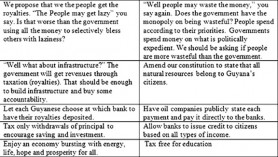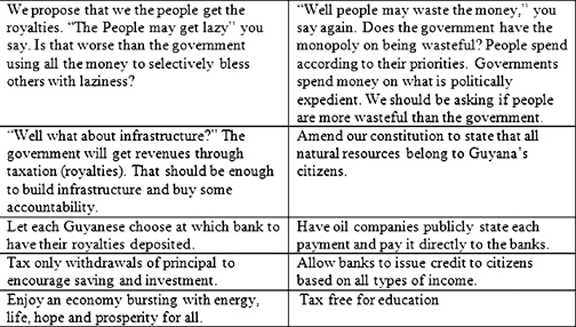By Peter R. Ramsaroop, MBA
Introduction
Two years ago, right about this time, I first introduced the concept that any oil reserves we find in Guyana are that of the citizens, not the company nor the government. I have revisited the concept once again in this piece. The years have passed and we have finally an update on the status of our oil exploration. It is estimated that close to 2.8 billion of barrels of oil could be in the Corentyne basin. The odds of finding no oil at all are 61 per cent. This leaves a 39 per cent chance of finding even a little oil at either one or both major drill sites.
 I wanted to once again explore the ‘oil formula’ we have proposed for the country so as to keep us focused on the prize that is ahead of us and not allow ourselves to be hoodwinked by the government. UK journalist Nicholas Shaxson says: “If citizens had the oil money in the first place, and the state had to bargain with them to get its cut, it seems likely that would change the game entirely.”
I wanted to once again explore the ‘oil formula’ we have proposed for the country so as to keep us focused on the prize that is ahead of us and not allow ourselves to be hoodwinked by the government. UK journalist Nicholas Shaxson says: “If citizens had the oil money in the first place, and the state had to bargain with them to get its cut, it seems likely that would change the game entirely.”
We continue to ask ourselves how our nation can have so much natural wealth and still be poor. Guyana is suffering from what academics call the “resource curse”. This happens when a country’s economy becomes too dependent on primary exports like oil and sugar; sugar in our case. It’s more likely to happen in a country with institutions that lack transparency and caring leadership for all. We see this lack of caring leadership in the government once again proposing local government elections without the reforms agreed to make the system work for the people.
The Facts
Maclean’s Magazine of Canada has said that Guyana may be able to eventually match Kuwait’s annual oil production of 500 million barrels. However, if only one tenth that amount is produced and royalties are 55 per cent, even at US$50 per barrel, that means an average annual payment of roughly US$1,800 per person or US$150 a month. We know oil prices have fluctuated over the last year so the number needs to be flexible. Given crude oil prices are in the US$80 per barrel and above range the numbers will be much higher.
If Guyana’s oil reserves are proven and then controlled by our government, it could spell disaster for our country. With the nature of our current politics we cannot allow simultaneous control of both political and economic power. We may be able to foster long-term prosperity and peace if we can somewhat separate political favour from economic opportunity. Just look at the recent LCDS issue where the money pledged by Norway for Guyana to conserve its forest are hogged by the government while displacing our own people that make a living from the forest such as the miners. We have researched and written about democratising the benefits to Guyanese of Guyana’s natural resources extracted from public property. This means that oil royalties would be dispersed evenly amongst our citizens. The government would have to accountably tax us in order to fund its operations.
Our proposal

Conclusion
The Parliamentarians need to start debating issues that affects us, not bicker among themselves on frivolous laws. Let us act now to secure our democracy by democratizing our natural resources extracted from public land. This also goes for when government gives away our properties like those in the past to friends instead of tax relief to us. Selling of the Diamond estate and then taking our tax money and bailing out GuySuCo are not favours to us the citizens; it is our money to be used prudently for the right projects.
Each Guyanese citizen will vote every day by spending or investing his or her share of the royalties in a free market economy. Nobody’s race will be an issue to someone wishing to sell or buy something. No one’s party affiliation will affect whether or not they profit from the public natural bounty that rightfully belongs to each and every one of us. This concept also applies to revenues paid to Guyana for conserving its forests within the context of the low carbon development strategy.
I don’t offer this as a solution to all our problems, but this might be the one thing that makes the biggest difference in our way of life. We propose that consultations be started on exploring these recommendations. Until next time “Roop”
Send comments to [email protected]





